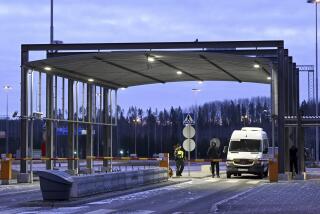Iran, Soviets Sign Accords Easing Cross-Border Visits
- Share via
NICOSIA, Cyprus — The Soviet Union, dogged by unrest in several of its Muslim republics, signed two protocols with Iran to make cross-border visits easier and asked Tehran to help return calm to their frontier, Tehran Radio reported Thursday.
It quoted Iran’s deputy foreign minister, Mahmoud Vaezi, as saying that the Kremlin should “treat the people in a prudent and peaceful manner.”
Vaezi told the visiting Soviet deputy minister for protocol and consular affairs, Boris N. Chaplin, that the agreements are in line with the demands of Soviet Azerbaijanis and other Muslims living near the two countries’ 1,080-mile frontier.
Chaplin asked Vaezi for Iran’s help to resolve problems of security and stability on the border, the radio said.
Tens of thousands of Soviet Azerbaijanis illegally crossed into Iran after they burned border posts in a series of demonstrations starting Dec. 31.
A similar number of Iranians also went to Soviet Azerbaijan, but Iranian media dismissed reports in Moscow’s official press that Azerbaijani nationalists fighting the central government received weapons from across the border.
Tehran Radio urged Moscow Wednesday not to use violence in Tadzhikistan, a Muslim republic in central Asia where 37 people were reported killed in ethnic riots this week. Last month Iran expressed regret about Moscow’s use of force in Azerbaijan.
Iran, which sees itself as protector of Muslims around the world, says people in both republics are striving to regain their Islamic identity after President Mikhail S. Gorbachev’s reforms ended decades of rigid Communist rule.
Tehran Radio said that under one of the agreements signed Thursday by Chaplin and his Iranian counterpart, Morteza Mir-Mehdi, Iranian and Soviet citizens living near the border could legally cross four times a year.
They may visit areas within 28 miles of designated points on the border, staying up to 15 days each time, said the radio, monitored in Nicosia.
The second agreement allows visits of up to two months on invitation from relatives or friends.
More to Read
Sign up for Essential California
The most important California stories and recommendations in your inbox every morning.
You may occasionally receive promotional content from the Los Angeles Times.













